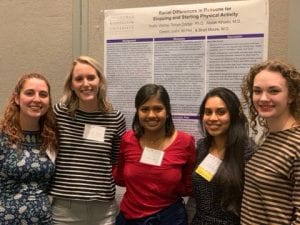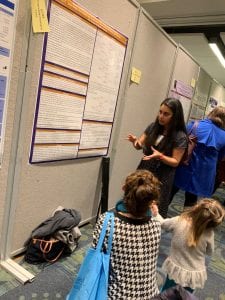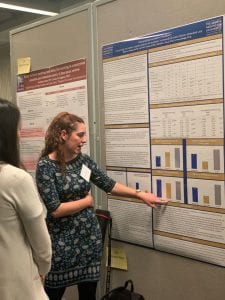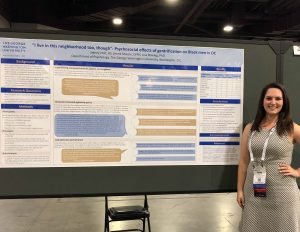Applied Social Psychology doctoral student, Mary Mbaba, has been selected to attend the 2019 Summer Institute for Social and Personality Psychology (SISPP) at New York University. This competitive program is funded in part by the National Science Foundation and by SISPP's graduate student training endowment. Congratulations, Mary!
Tag: applied social psychology
ASP grad students present research at SBM conference!
Sidney Holt wins 2017 Outstanding Student Abstract award at the American Public Health Association (APHA) conference
Congrats to Applied Social Psychology doctoral student Sidney Holt on the 2017 Outstanding Student Abstract award at the American Public Health Association (APHA) conference! Her abstract was entitled, “I Live in this Neighborhood Too, Though”: Psychosocial Effects of Gentrification on Black men in DC.
The abstract details analyses that Holt conducted based on focus groups with Black men from Menhood, a National Institutes of Health-funded study designed to examine the effects of neighborhood and individual-level stressors and resilience on sexual risk for Black men who live in Washington, DC. Holt’s supervising professor, Dr. Lisa Bowleg is the Principal Investigator of Menhood.
Holt’s research highlighted that gentrification led participants to experience heightened police presence within their neighborhoods and in turn, increased discriminatory encounters with police; segregation and social exclusion from their new White neighbors; restricted mobility within their neighborhoods; fear of displacement; loss of belonging and sense of community; and self-blame and a sense of powerlessness to stop gentrification. All of these experiences have the potential to negatively impact health and well-being. Holt’s work fills an important gap within the social and behavioral science literature. Holt notes that although media attention about gentrification in DC has increased in recent years —DC was the second fastest gentrifying city in the U.S. from 2000 to 2010 — it’s relatively rare that researchers seek to learn about gentrification primarily from the perspective of long-time, low-income Black residents. Holt says that she hopes that her work will prompt researchers, policymakers and health providers to consider the social and mental health effects of gentrification, and not conceptualize gentrification primarily as an urban development phenomenon with only economic and political ramifications.





